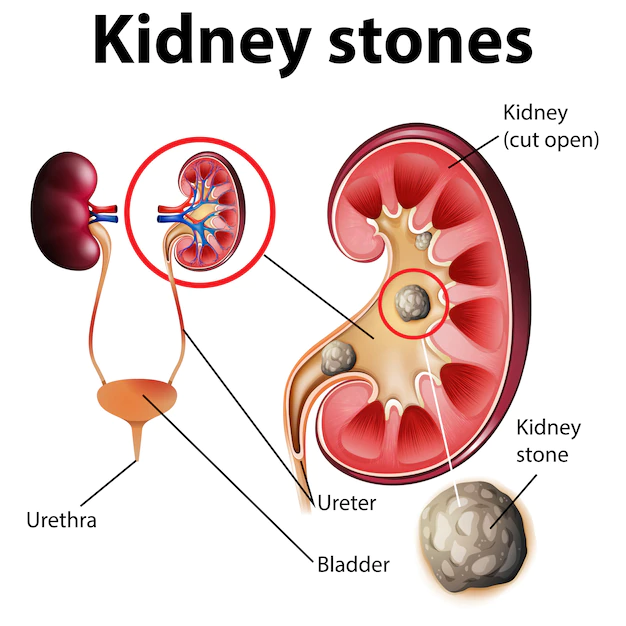Can a 7mm Kidney Stone Dissolve?

- Introduction
- Understanding Kidney Stones
- Types of Kidney Stones 3.1 Calcium Stones 3.2 Uric Acid Stones 3.3 Struvite Stones 3.4 Cystine Stones
- Symptoms of Kidney Stones 4.1 Pain and Discomfort 4.2 Changes in Urination 4.3 Nausea and Vomiting 4.4 Blood in Urine
- Causes of 7mm Kidney Stones 5.1 Dehydration 5.2 Diet and Nutrition 5.3 Family History
- Diagnosis and Evaluation 6.1 Physical Examination 6.2 Imaging Tests 6.3 Blood and Urine Tests
- Treatment Options for 7mm Kidney Stones 7.1 Drinking Plenty of Water 7.2 Pain Management 7.3 Medications 7.4 Extracorporeal Shock Wave Lithotripsy (ESWL) 7.5 Ureteroscopy 7.6 Percutaneous Nephrolithotomy (PCNL) 7.7 Natural Remedies and Lifestyle Changes
- Can a 7mm Kidney Stone Dissolve Naturally?
- Timeframe for Dissolving 7mm Kidney Stones
- When Surgery is Necessary
- Prevention of Kidney Stones 11.1 Hydration 11.2 Dietary Changes 11.3 Medications
- Conclusion
- FAQs 13.1 What causes kidney stones? 13.2 How long does it take for a 7mm kidney stone to dissolve naturally? 13.3 Is surgery the only option for large kidney stones? 13.4 Can diet and lifestyle changes prevent kidney stones? 13.5 What are the symptoms of kidney stones?
Can a 7mm Kidney Stone Dissolve?

Introduction
Kidney stones are small, hard mineral deposits that form in the kidneys. They can range in size from tiny grains to larger stones, measuring several millimeters. A 7mm kidney stone falls into the category of moderately-sized stones and can cause considerable discomfort and pain for those affected. In this article, we will explore whether a 7mm kidney stone can dissolve naturally and the various treatment options available.
Understanding Kidney Stones
Kidney stones can be composed of different substances, with the most common types being calcium stones and uric acid stones. Less common types include struvite stones and cystine stones. Each type has its unique characteristics and may require specific treatment approaches.
Types of Kidney Stones
1. Calcium Stones
They form when calcium combines with oxalate or phosphorus in the urine.
2. Uric Acid Stones
Uric acid stones form when the urine contains excessive uric acid, which can result from a diet high in purines.
3. Struvite Stones
They can grow rapidly and become quite large.
4. Cystine Stones
Cystine stones are rare and typically result from a hereditary disorder that causes the kidneys to excrete excessive amounts of certain amino acids.
Symptoms of Kidney Stones

Kidney stones may not always cause symptoms, but when they do, the following signs are common:
4.1 Pain and Discomfort
The most typical symptom of kidney stones is severe pain in the back or side, often radiating to the lower abdomen and groin.
4.2 Changes in Urination
People with kidney stones may experience changes in their urination patterns, including increased frequency and urgency.
4.3 Nausea and Vomiting
Persistent nausea and vomiting can occur, especially if the stone causes a blockage or severe pain.
Causes of 7mm Kidney Stones
The formation of 7mm kidney stones can be attributed to various factors, including:
5.1 Dehydration
Inadequate fluid intake can lead to concentrated urine, increasing the risk of stone formation.
5.2 Diet and Nutrition
A diet high in sodium, sugar, and certain foods like spinach, rhubarb, and red meat can contribute to stone formation.
5.3 Family History
A family history of kidney stones can predispose an individual to develop stones themselves.
Diagnosis and Evaluation
To determine the presence of kidney stones and their size, doctors may conduct the following tests:
6.1 Physical Examination
A physical examination, including a review of the patient’s medical history and symptoms, can provide valuable insights.
6.2 Imaging Tests
Imaging tests such as X-rays, CT scans, and ultrasounds can visualize kidney stones and their location.
6.3 Blood and Urine Tests
Blood tests can assess kidney function and detect certain substances that may contribute to stone formation. Urine tests can also reveal the presence of abnormal substances.
Treatment Options for 7mm Kidney Stones
The appropriate treatment for a 7mm kidney stone depends on factors such as the type of stone and its location.
7.1 Drinking Plenty of Water
Staying well-hydrated is essential for patients with kidney stones, as increased fluid intake can facilitate the passage of small stones.
7.2 Pain Management
Over-the-counter pain medications may be prescribed to manage the discomfort caused by kidney stones.
7.3 Medications
Certain medications can help dissolve or prevent the formation of specific types of kidney stones.
7.4 Extracorporeal Shock Wave Lithotripsy (ESWL)
ESWL is a non-invasive procedure that uses shock waves to break down kidney stones into smaller pieces, making them easier to pass.
7.5 Ureteroscopy
Ureteroscopy involves the insertion of a thin, flexible scope into the urinary tract to remove or break up stones.
7.6 Percutaneous Nephrolithotomy (PCNL)
PCNL is a surgical procedure that involves making a small incision in the back to access and remove large kidney stones.
7.7 Natural Remedies and Lifestyle Changes
In addition to medical treatments, certain natural remedies and lifestyle changes can complement kidney stone management.
Can a 7mm Kidney Stone Dissolve Naturally?
In some cases, smaller kidney stones, including 7mm ones, can dissolve naturally if the conditions are right. However, this process can take time, and it is crucial to closely monitor the stone’s size and the patient’s condition.
Timeframe for Dissolving 7mm Kidney Stones
The timeframe for naturally dissolving a 7mm kidney stone can vary widely from individual to individual. It may take weeks to months, and the stone may not dissolve completely, requiring additional treatments.
When Surgery is Necessary
If a 7mm kidney stone causes severe pain, obstruction, or other complications, surgical intervention may be necessary for its removal.
Prevention of Kidney Stones
Taking preventive measures can reduce the likelihood of recurrent kidney stones.
11.1 Hydration
Drinking an adequate amount of water daily can dilute the urine and decrease the risk of stone formation.
11.2 Dietary Changes
Adopting a balanced diet low in sodium and purines can minimize the risk of certain types of kidney stones.
11.3 Medications
In some cases, doctors may prescribe medications to prevent the recurrence of specific types of kidney stones.
Conclusion
In conclusion, a 7mm kidney stone can potentially dissolve naturally, but it is essential to monitor the situation closely and seek medical advice. Various treatment options are available to manage kidney stones effectively. Preventive measures, such as staying hydrated and adopting a healthy diet, can play a crucial role in reducing the risk of future kidney stone formation.
FAQs
13.1 What causes kidney stones?
Kidney stones can form due to various factors, including dehydration, dietary choices, and genetic predisposition.
13.2 How long does it take for a 7mm kidney stone to dissolve naturally?
The timeframe for a 7mm kidney stone to dissolve naturally varies from person to person and may take several weeks to months.
13.3 Is surgery the only option for large kidney stones?
Surgery may be necessary for large kidney stones causing severe pain or obstruction.
13.4 Can diet and lifestyle changes prevent kidney stones?
Yes, adopting a balanced diet, staying hydrated, and making lifestyle changes can help prevent kidney stone formation.
13.5 What are the symptoms of kidney stones?
Common symptoms of kidney stones include severe pain, changes in urination patterns, nausea, vomiting, and blood in the urine.

